The Great Vodka Freezer Mystery: Setting the Record Straight
Does vodka freeze? This kitchen myth has sparked countless debates among spirit enthusiasts and casual drinkers alike. You've probably heard someone claim their vodka turned solid in the freezer, while others insist it's impossible.
Quick Answer:
- Standard vodka (80 proof/40% ABV) freezes at -27°C (-16°F)
- Your home freezer runs at -18°C (0°F) - not cold enough
- Vodka gets thick and viscous but won't freeze solid
- Only malfunctioning freezers might reach vodka's freezing point
The confusion comes from vodka's unique properties. Unlike water, which freezes at 0°C (32°F), vodka contains ethanol that dramatically lowers its freezing point through a process called freezing point depression. This means your premium bottle is safe from turning into a vodka popsicle in your standard kitchen freezer.
But here's where it gets interesting: while your vodka won't freeze solid, the extreme cold does change its character. Some swear by ice-cold vodka for its smooth texture, while others argue it masks the subtle flavors that define quality spirits.
I'm Sylwester Skóra, co-founder of Two Flags Vodka, and through years of crafting premium spirits, I've learned that understanding does vodka freeze is crucial for proper storage and serving. My experience in vodka production has taught me that temperature dramatically affects how you experience our carefully crafted spirit.
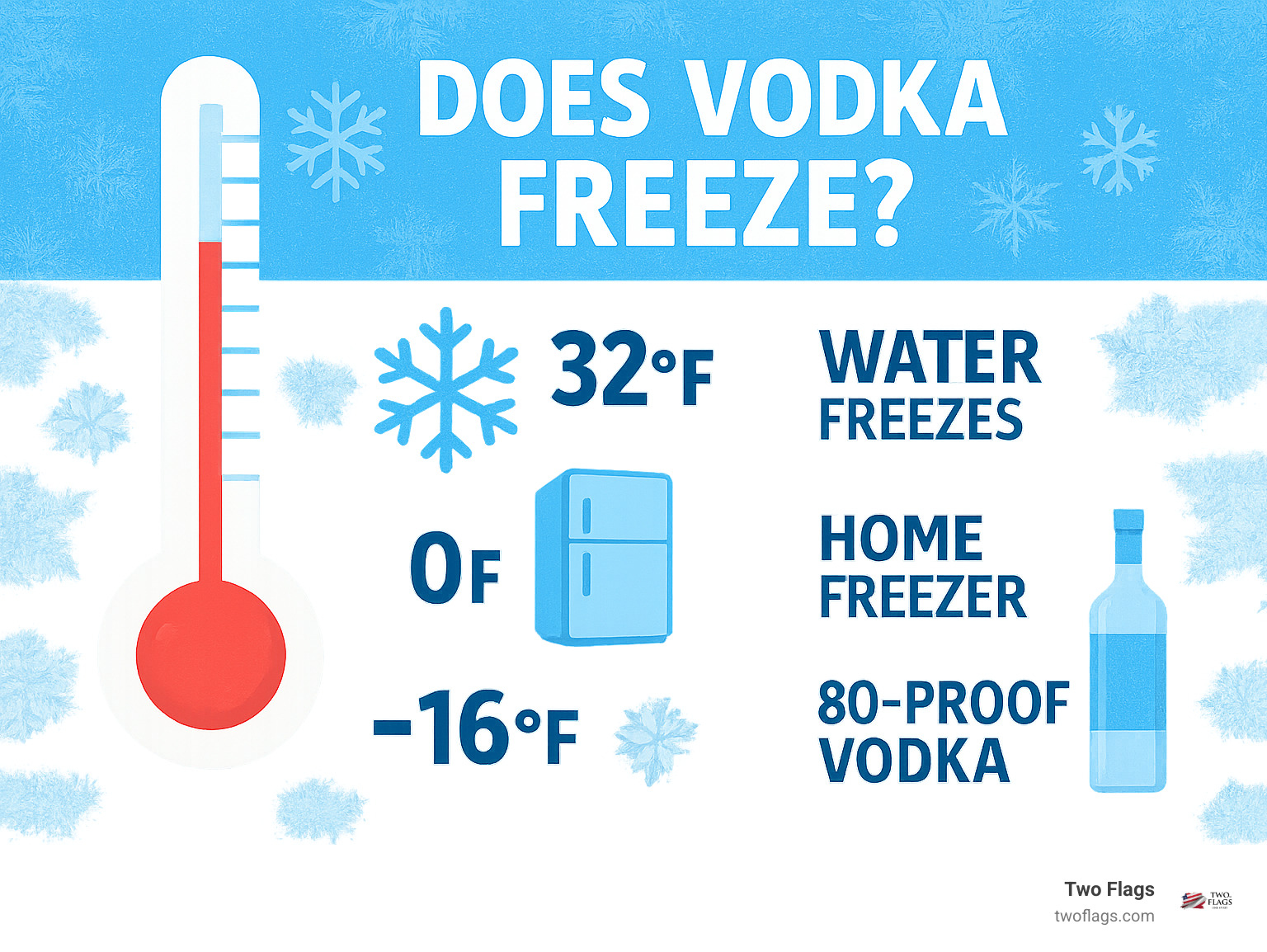
Find more about Does vodka freeze?:
- How to choose vodka?
- Best Polish vodka?
- Vodka with soda?
Does Vodka Freeze? The Science Behind the Chill
Understanding does vodka freeze requires a quick dive into basic chemistry, but don't worry – it's simpler than you might think. The answer lies in what makes vodka, well, vodka.
Vodka is essentially a marriage of two very different liquids: water and ethanol (the type of alcohol we drink). Water freezes at 0°C (32°F) – no surprises there. But ethanol is a completely different beast, refusing to freeze until it hits a bone-chilling -114°C (-173.2°F).
When you mix these two together, something fascinating happens called freezing point depression. Think of ethanol molecules as tiny troublemakers that crash water's freezing party. They literally get in the way of water molecules trying to form ice crystals, forcing the entire mixture to get much colder before it can freeze solid.
The Alcohol by Volume (ABV) percentage determines just how much these ethanol troublemakers can interfere. Most vodkas, including our Two Flags One Spirit, clock in at 80 proof, which means 40% ABV. This specific ratio creates a freezing point of approximately -27°C (-16°F).
Your standard home freezer runs at about -18°C (0°F) – significantly warmer than vodka's freezing point. This temperature gap is why your bottle stays liquid even after hours in the freezer.
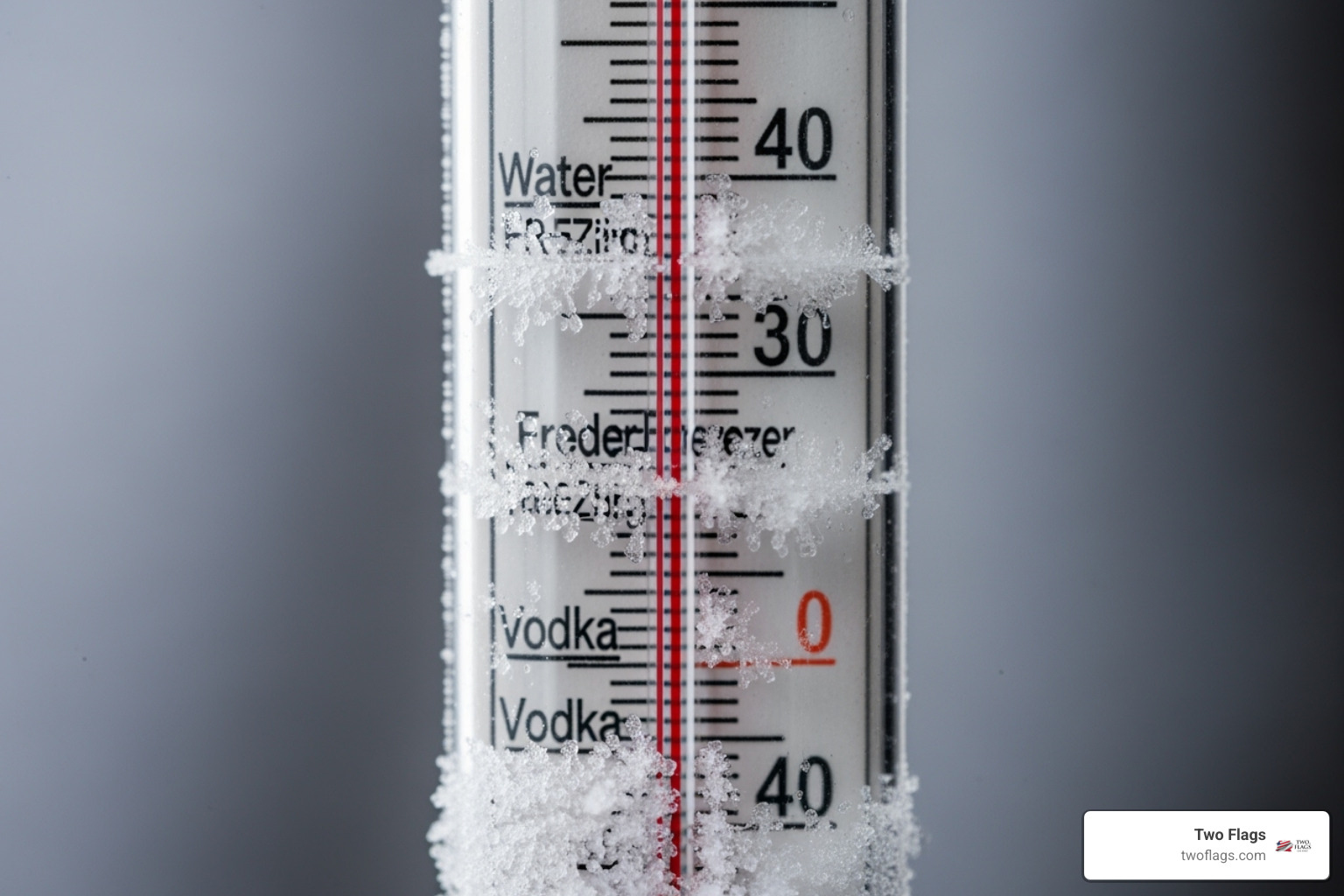
What is the freezing point of vodka?
For 80 proof vodka (40% ABV), the magic number is -27°C (-16°F). This isn't just a random temperature – it's where the battle between water wanting to freeze and ethanol preventing it finally ends with water winning.
The beauty of understanding how ABV lowers the freezing point is realizing that alcohol essentially acts like nature's antifreeze. The more alcohol in your vodka, the colder it needs to get before freezing solid. Higher proof vodkas have even lower freezing points, while lower proof spirits might freeze at slightly warmer temperatures.
Why 80 proof is the standard makes perfect sense when you consider this science. It provides the ideal balance – strong enough to resist freezing in normal conditions, yet smooth enough for enjoyable drinking. This proof level gives vodka its characteristic resistance to cold while maintaining its clean, neutral flavor profile.
So, will vodka freeze solid in a home freezer?
Here's the straightforward answer: No, standard 80-proof vodka won't freeze solid in your home freezer. The temperature gap between your freezer's -18°C (0°F) and vodka's -27°C (-16°F) freezing point creates a safe buffer zone.
However, your vodka won't stay exactly the same. Standard freezer limitations mean you'll notice the liquid becoming noticeably thicker and more viscous – almost syrupy. This change creates what many call the "vodka slushy" effect, where the spirit takes on an almost gel-like consistency.
What to expect is a thick, viscous liquid that pours slower than room-temperature vodka but remains completely drinkable. You might even spot tiny ice crystals forming if the bottle has been opened frequently, allowing some alcohol to evaporate and slightly raising the freezing point.
The only time vodka might actually freeze solid is with malfunctioning freezers that run continuously due to broken thermostats. If your vodka ever does freeze completely solid, it's probably time to call a repair technician!
For those exploring different serving options, our gluten-free Two Flags One Spirit offers versatility whether chilled or at room temperature. Check out Beyond Beer: Finding Your Gluten-Free Drink Options for more ideas on incorporating premium vodka into your drinking repertoire.
To Chill or Not to Chill: The Great Vodka Temperature Debate
Now that we've solved the "does vodka freeze?" mystery, let's tackle an equally passionate debate: should you actually store your vodka in the freezer? This question divides vodka lovers into two camps, and honestly, both sides have compelling arguments.
Temperature dramatically changes how vodka behaves in your glass and on your palate. When vodka gets ice-cold, its viscosity increases, making it feel thicker and silkier. But here's the catch – extreme cold also numbs your taste buds and suppresses those delicate volatile compounds that carry flavor and aroma. It's like turning down the volume on a beautiful song; you'll still hear the main melody, but you'll miss all the subtle harmonies that make it special.
Think of it this way: your tongue simply isn't great at tasting frozen things. Ever notice how ice cream flavors seem muted when they're rock-hard from the freezer? The same principle applies to vodka.
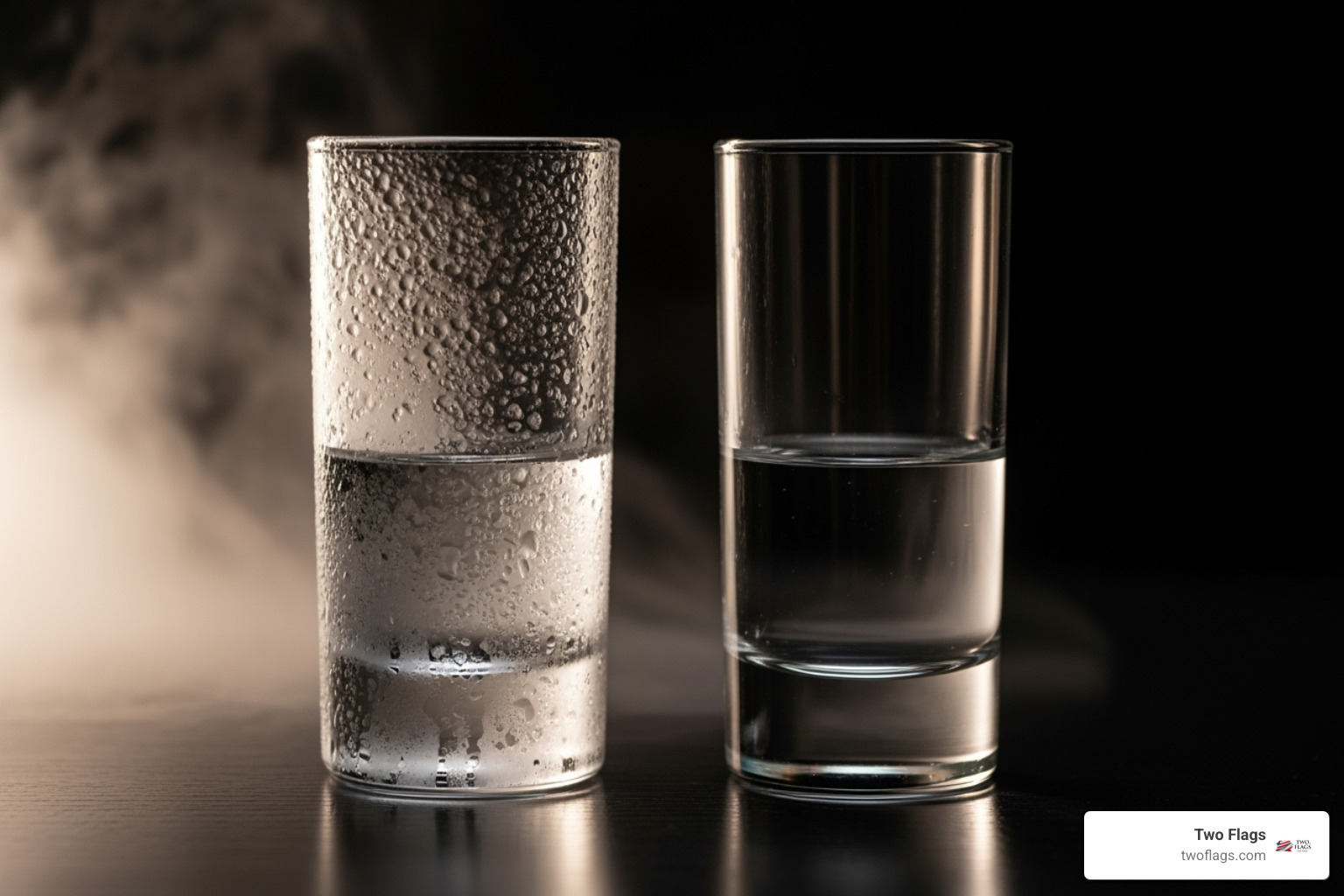
The Benefits: Why People Love Ice-Cold Vodka
There's something undeniably appealing about pulling a frosty bottle from the freezer. Many vodka enthusiasts swear by the deep-freeze method, and they have good reasons.
Ice-cold vodka feels incredibly smooth thanks to that increased viscosity we mentioned. The thick, almost syrupy texture glides across your tongue, creating a luxurious mouthfeel that many find irresistible. This smoother texture is especially noticeable when drinking vodka neat or as shots.
The cold also works magic on alcohol's natural "burn." If you've ever winced at the sharp bite of room-temperature vodka, chilling mutes that alcohol harshness significantly. The spirit becomes much more approachable, especially for those who are sensitive to alcohol's intensity.
And let's be honest – there's pure pleasure in that refreshing coldness, especially on a warm day or when you want something crisp and clean. Ice-cold vodka is ideal for shots and simple cocktails like martinis, where you want the spirit to be the star without any harsh edges.
Whether you're sipping our Two Flags Vodka straight or mixing it into something refreshing, proper chilling can definitely improve your experience. Speaking of mixing, if you love simple vodka sodas, check out our guide: Beyond Basic Bubbles: Lift Your Vodka Soda Game.
The Drawbacks: Why You Shouldn't Freeze Premium Vodka
Here's where things get interesting – and where I have to put on my vodka producer hat. While chilling is wonderful, there's a big difference between "nicely chilled" and "frozen solid." For premium vodkas like Two Flags, excessive cold can actually work against you.
Premium vodka loses its complex flavors when it's too cold. Our Two Flags Vodka is carefully crafted in Poland using organic, gluten-free ingredients, creating subtle nuances from the grain that make each sip special. When vodka is freezer-cold, these delicate characteristics get masked, making even exceptional spirits taste generic and flat.
The science behind this involves volatile compounds – tiny aromatic molecules that carry flavor from your glass to your nose and palate. As Kevin Liu, chief cocktail maker at The Tin Pan explains about spirits and temperature, these volatiles become much harder to detect when liquids are extremely cold. You're essentially dulling the very qualities that distinguish premium vodka from bottom-shelf options.
There's also the palate numbing effect. When your tongue gets too cold, it simply can't taste as well. You lose the ability to appreciate texture, subtle flavors, and the overall craftsmanship that goes into creating quality vodka.
Expert opinions consistently favor moderate chilling over deep freezing for premium spirits. The sweet spot for serving vodka is between 0-4°C (32-39°F) – cold enough to be refreshing and smooth, but not so cold that you lose the spirit's character.
At Two Flags, we want you to experience everything our vodka has to offer. After all, why invest in premium quality if you're going to mask what makes it special? For more insights on appreciating fine vodka, take a look at Your Ultimate Guide to Picking the Perfect Vodka.
A Practical Guide to Storing and Serving Vodka
Proper storage might seem straightforward, but getting it right makes all the difference in preserving your vodka's quality. The good news? Vodka is remarkably forgiving compared to other spirits, but a few simple practices will ensure you're always getting the best experience from your bottle.
Light and heat are vodka's main enemies. Store your Two Flags Vodka in a cool, dark place away from direct sunlight and heat sources like radiators or stovetops. While heat won't make vodka "go bad" in the traditional sense, it can slowly accelerate oxidation, subtly changing the flavor profile over very long periods.
Always store bottles upright, especially if they have natural corks. This prevents the high-proof alcohol from potentially eroding the cork and introducing unwanted flavors into your premium spirit.
Here's something that might surprise you: both opened and unopened bottles of vodka can last for decades when stored properly. An opened bottle will experience very slow evaporation over many years, which might slightly reduce its alcohol content, but for practical purposes, your vodka will remain perfectly good for far longer than you'll likely keep it around.
The key is consistency in storage conditions. Temperature fluctuations and exposure to light are more harmful than simply storing vodka at room temperature in a dark cabinet.

What is the Best Temperature to Serve Vodka?
Here's where the magic happens – finding that sweet spot between refreshing coolness and flavor preservation. For premium vodkas like Two Flags, the ideal serving temperature is 0-4°C (32-39°F). This range gives you that satisfying chill without completely numbing your taste buds.
At this temperature, you'll experience the smooth, clean profile that makes our Polish-crafted vodka special. The coolness tames any alcohol heat while still allowing those subtle flavor notes to shine through.
Getting to the perfect temperature is easier than you might think. The refrigerator method is foolproof – just store your Two Flags Vodka in the fridge for a few hours before serving. For faster results, try an ice bath: submerge the bottle in a bucket with ice and a little water for 20-30 minutes.
Don't forget about your glassware! Chilled glasses make a huge difference. Pop your shot glasses or martini glasses in the refrigerator for a few minutes before pouring. There's nothing quite like the sensation of perfectly chilled vodka hitting an equally cold glass.
This careful attention to temperature is what separates a good drinking experience from an exceptional one. Ready to explore more about premium vodka service? Check out our guide: Raise Your Glass: Top-Rated Vodkas for Discerning Drinkers.
Will a Vodka Bottle Explode in the Freezer?
This question pops up surprisingly often, and I understand the concern. The short answer for standard 80-proof vodka? You're almost certainly safe.
Here's the science: liquids expand when they freeze. Water expands by about 9%, which is why a full water bottle will burst in your freezer. But remember our earlier discussion about does vodka freeze? Since 80-proof vodka doesn't freeze solid in your home freezer, it won't undergo that dramatic expansion.
Headspace in the bottle acts as your safety buffer. Most vodka bottles aren't filled to the absolute brim, giving the liquid room to contract and expand slightly without creating dangerous pressure.
The main risk comes from lower-proof mixtures. If you've got a vodka-based drink with a significantly lower alcohol content, or you've mixed vodka with water or juice, that mixture might actually freeze solid. In those cases, a completely full container could crack or burst.
Glass bottle safety isn't usually a concern with standard vodka storage. Your typical home freezer simply can't reach the temperatures needed to freeze 80-proof vodka solid.
That said, it's always smart to leave a bit of headspace if you're planning to store any bottle in extremely cold conditions. But for your everyday freezer storage of Two Flags Vodka, you can rest easy – your bottle will get beautifully thick and viscous, but it won't turn into a frozen vodka bomb.
Frequently Asked Questions About Freezing Spirits
People always have questions about does vodka freeze and how it behaves compared to other spirits. After years in the vodka business, I've heard them all! Let me share the answers to the most common ones.
Can vodka freeze if mixed with water or juice?
Now here's where things get interesting! Yes, vodka absolutely can freeze when you mix it with water or juice. The secret lies in what happens to the alcohol content when you start mixing.
When you combine Two Flags Vodka with water, juice, or any mixer, you're lowering the overall alcohol by volume (ABV) of your drink. Remember how we learned that vodka's high alcohol content keeps it from freezing? Well, dilute that alcohol enough, and suddenly your mixture behaves more like regular water.
Think about it this way: a vodka cranberry cocktail has much less alcohol percentage than straight vodka. Add enough cranberry juice, and that drink might turn slushy in your freezer. This is exactly how people make vodka slushies and alcoholic popsicles - by finding the sweet spot where there's enough alcohol for flavor but not so much that it won't freeze.
The dilution ratio matters enormously here. A splash of juice in your vodka? It'll still stay liquid. But a heavily diluted cocktail? That's heading straight for slush territory.
Is it safe to drink vodka that has frozen and then thawed?
Absolutely! You can drink vodka that's been frozen and thawed without any safety concerns. Freezing alcohol doesn't create harmful chemicals - it's a purely physical change, not a chemical one.
What you might notice is a slight change in texture or taste. Some people find that vodka tastes milder or smoother after going through a freeze-thaw cycle. The extreme cold can temporarily alter how you perceive certain flavors, but the alcohol content stays exactly the same.
The only thing to watch out for is the bottle itself. Make sure the glass didn't crack during freezing. But the vodka inside? It's perfectly fine to enjoy. No harmful chemical reactions occur during this process - it's just physics doing its thing.
How does freezing vodka compare to freezing other complex spirits?
This question gets to the heart of why vodka handles freezing so much better than many other spirits. It's all about volatile compounds and flavor complexity.
Two Flags Vodka is what we call a neutral spirit. We distill it to be clean and pure, with minimal complex flavor compounds. That's actually the point - vodka should be smooth and versatile. Because it has fewer delicate aromatic molecules, chilling it deeply doesn't destroy its essential character the way it would with more complex spirits.
In contrast, aged spirits develop intricate flavor profiles through years in barrels and careful distillation processes. These spirits are celebrated for their complexity—all those subtle notes of vanilla, oak, smoke, or fruit that connoisseurs treasure.
When you freeze these complex spirits, you're essentially muting all those carefully crafted flavors. The cold numbs your palate and suppresses the volatile compounds that carry those beautiful aromas. It's like putting a blanket over a symphony orchestra - you lose all the nuanced details that make the experience special.
Vodka's clean profile means it doesn't lose complexity it never had in the first place. While freezing premium vodka like Two Flags might mask some subtle grain notes, it doesn't destroy years of barrel aging or complex distillation artistry.
That's why you'll see vodka bottles happily sitting in freezers while enthusiasts of more complex, aged spirits often prefer them at room temperature or with just a single ice cube that melts slowly.
Conclusion: The Cold, Hard Truth
So, does vodka freeze? After diving deep into the science and practical considerations, we now have our definitive answer. Your standard 80-proof vodka won't turn into a solid block in your home freezer, but it will get deliciously thick and viscous. The freezing point of -27°C (-16°F) is simply too low for most household appliances to reach.
The real revelation isn't about freezing – it's about finding that sweet spot for serving temperature. A properly chilled vodka between 0 to 4 degrees Celsius improves the drinking experience by smoothing harsh edges while preserving the spirit's character. Go too cold, and you're essentially putting a mute button on all those subtle flavors that make premium vodka special.
This is especially true for our Two Flags Vodka. We craft each bottle in Poland using organic, gluten-free ingredients, earning recognition as "Exceptional" from the Beverage Testing Institute. When you deep-freeze premium vodka like ours, you're hiding the very craftsmanship that sets it apart. Those delicate notes and smooth finish that come from careful distillation get masked by the extreme cold.
The choice ultimately comes down to what you're looking for in your vodka experience. Want something smooth and easy for shots with friends? A freezer-cold pour works perfectly. Planning to savor the nuanced character of a quality spirit? Keep it chilled but not frozen, and you'll taste the difference that authentic Polish craftsmanship makes.
Whether you store your bottle in the refrigerator or give it a quick ice bath before serving, you can now make informed decisions about temperature without worrying about exploding bottles or ruined vodka. The science is clear, the myths are busted, and the perfect serve is in your hands.
Ready to experience what exceptional vodka tastes like at the ideal temperature? Find more about premium spirits and what makes our Polish vodka stand out: Find our guide to premium vodka brands. Na zdrowie!


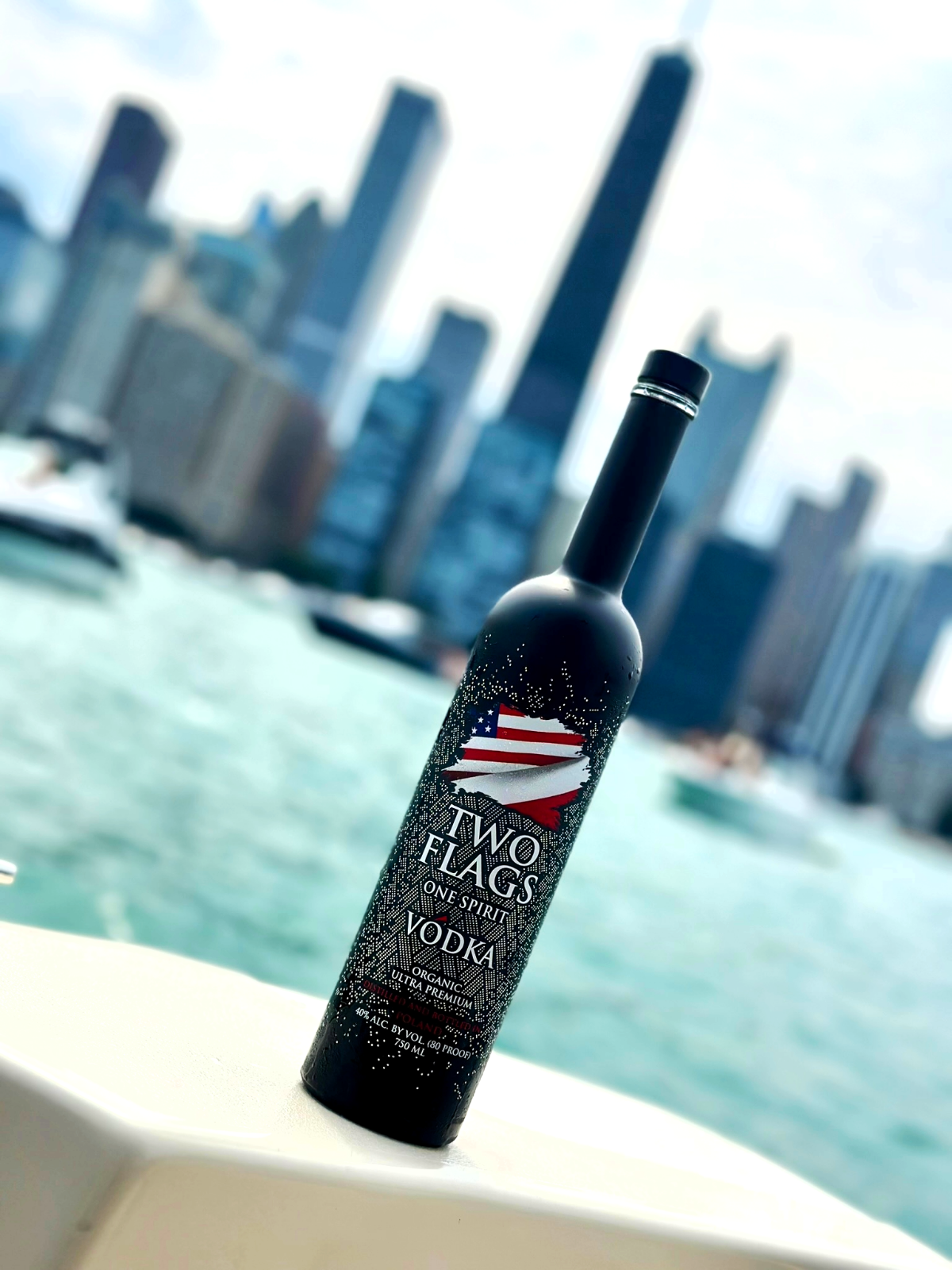

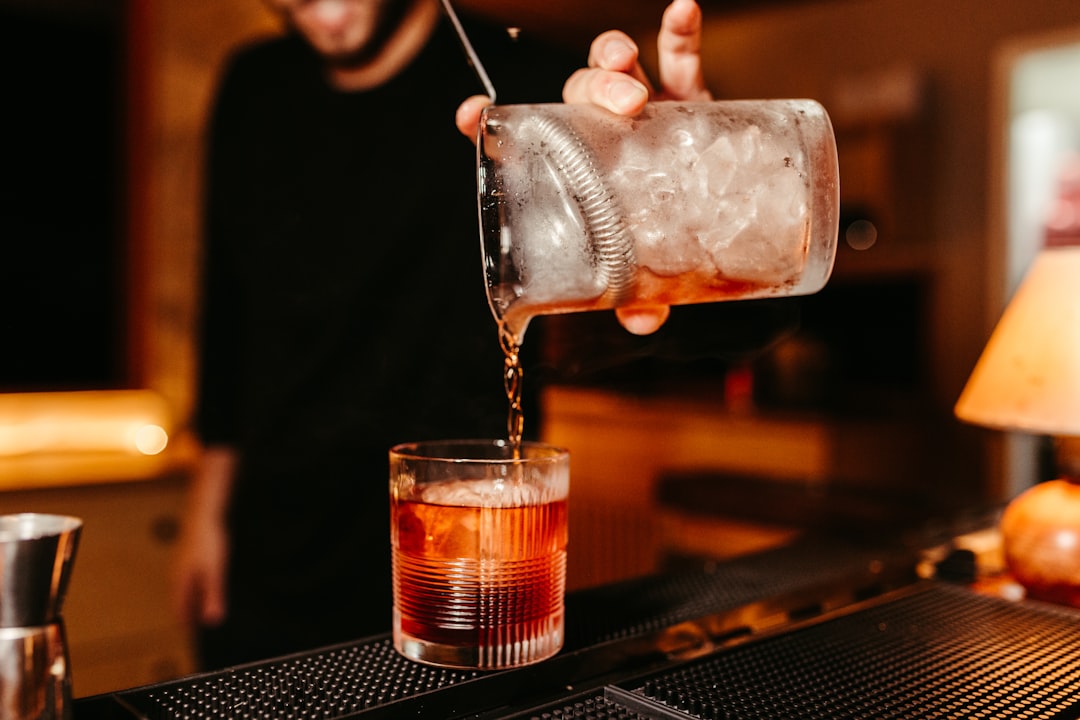
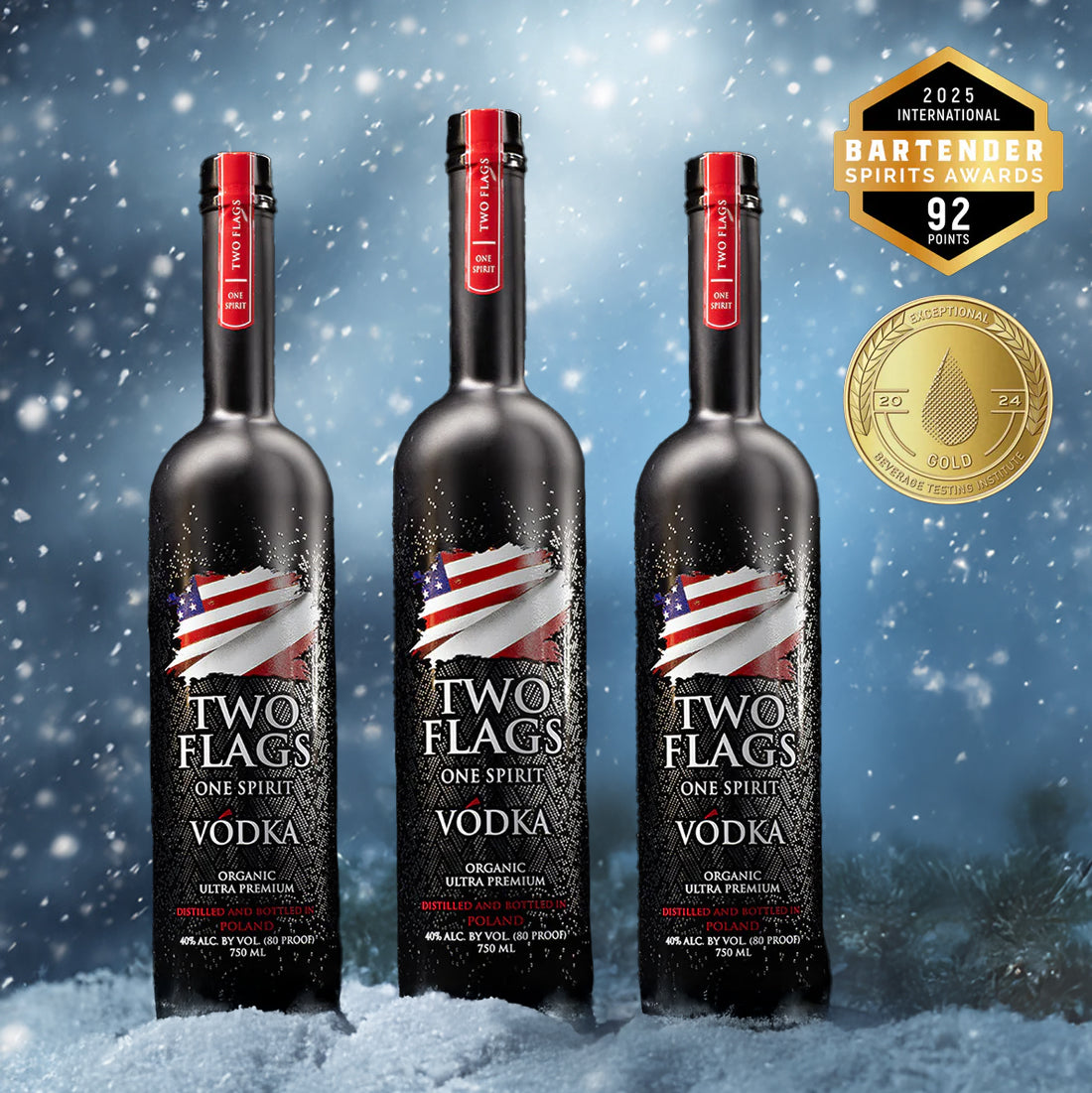
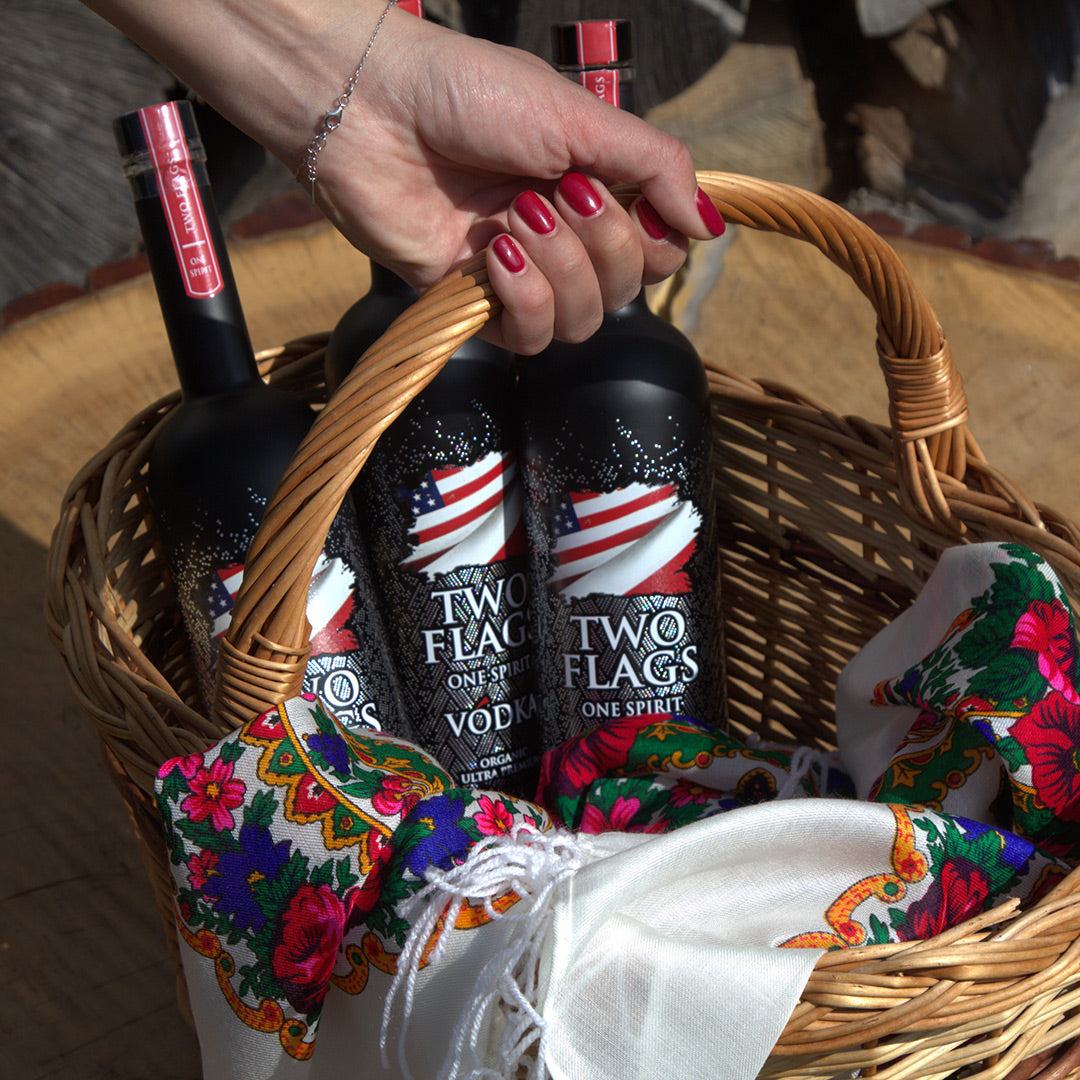
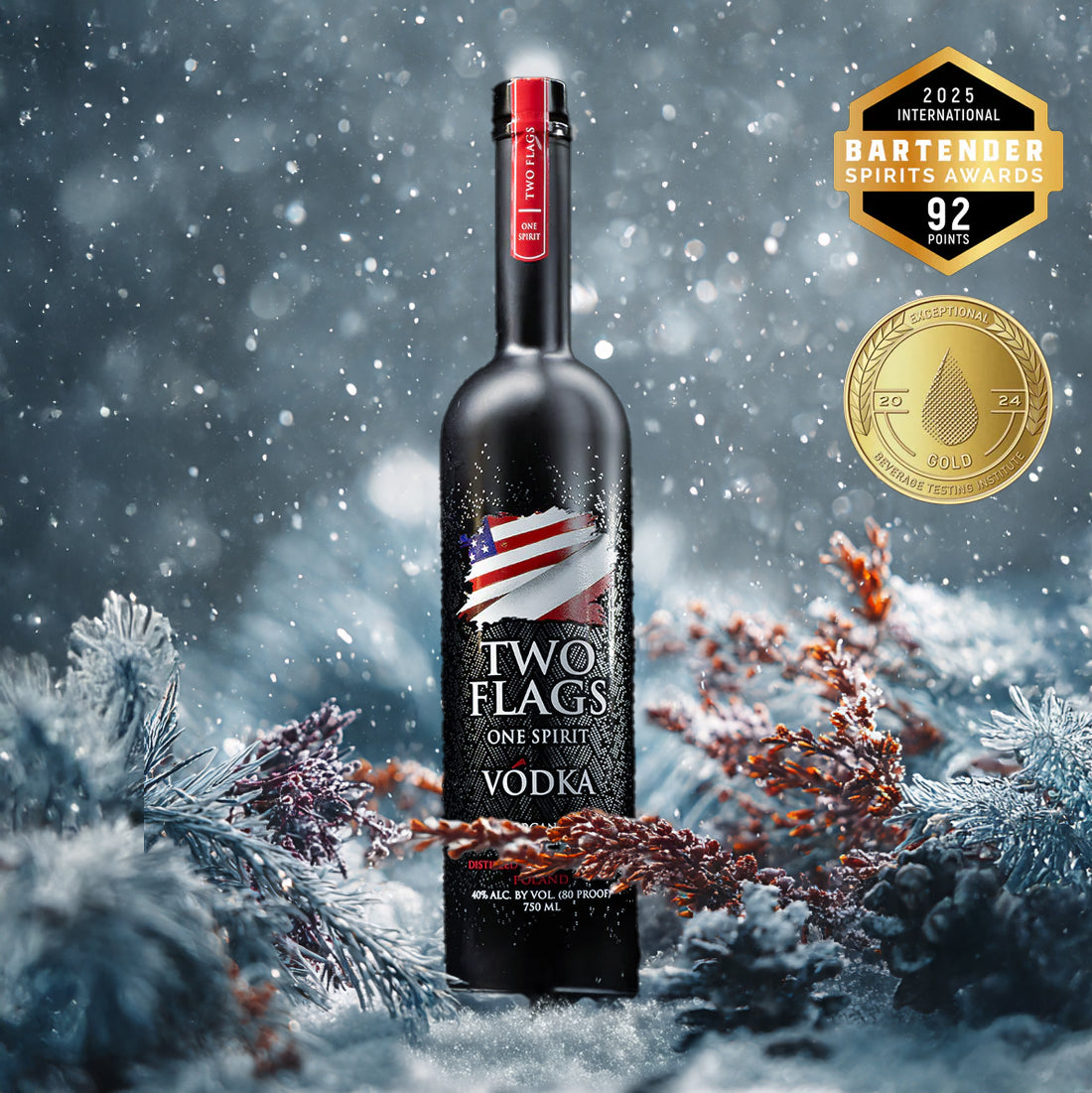
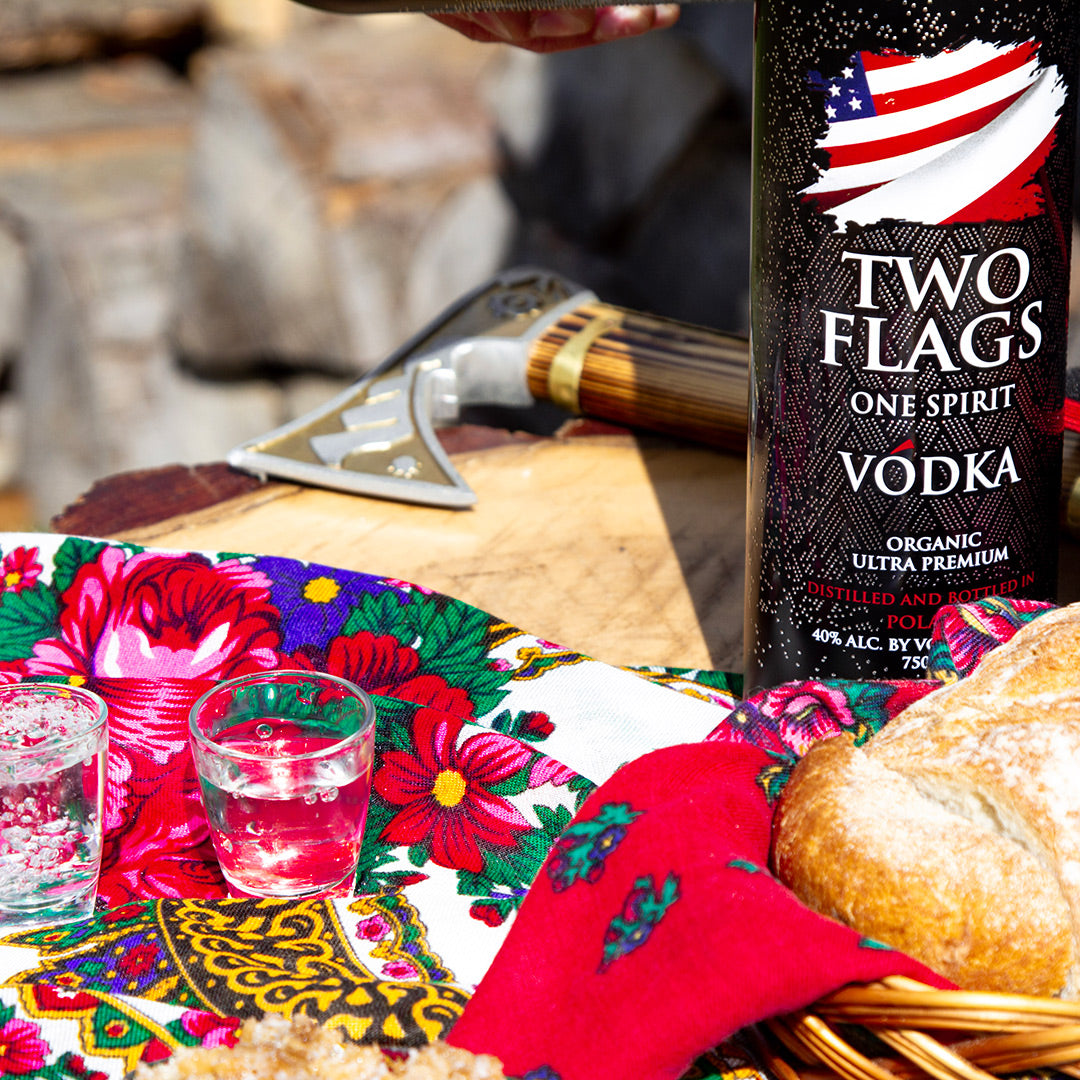
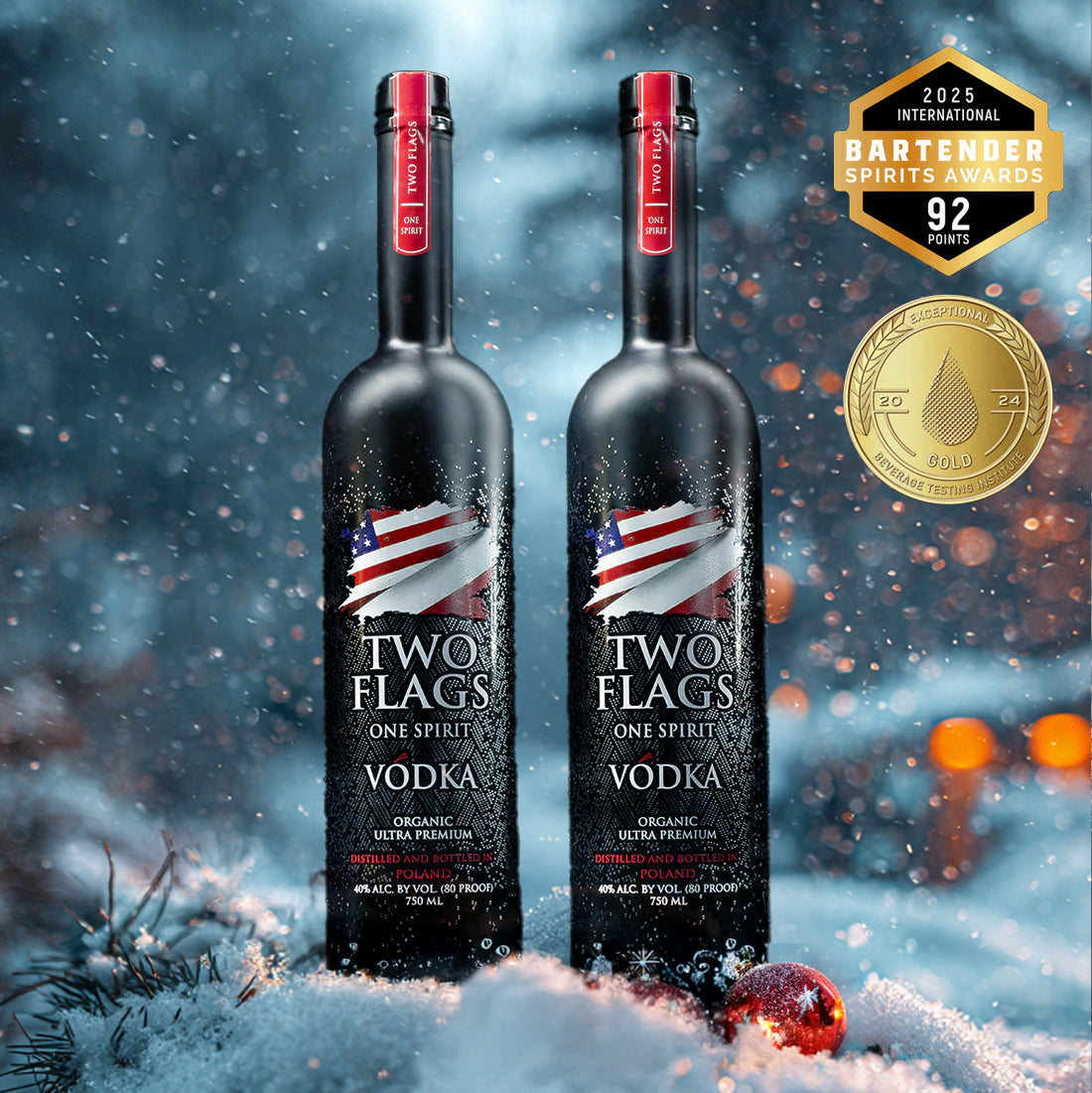
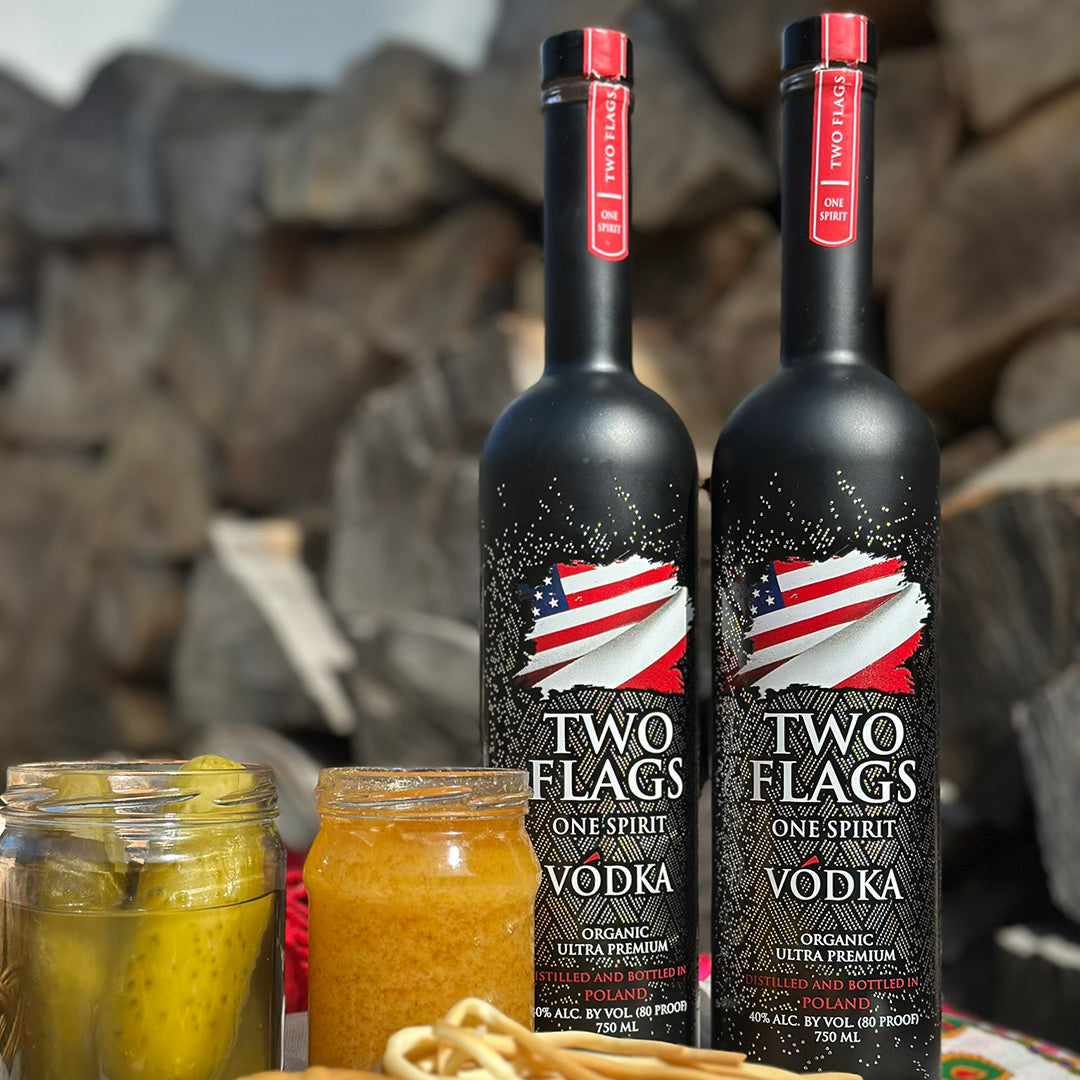
Leave a comment
This site is protected by hCaptcha and the hCaptcha Privacy Policy and Terms of Service apply.